By Dr. Vishal Sahni, Shoulder Specialist, London Orthopedic Clinic, Nagpur
Shoulder pain can slowly creep into your life, making even simple activities like dressing, eating, or sleeping difficult. While medicines, physiotherapy, and injections can help in the early stages, sometimes these treatments are not enough.
In such cases, shoulder replacement surgery can restore comfort, mobility, and independence.
Let’s explore in detail when you should seriously consider a shoulder replacement.
What is Shoulder Replacement?
Shoulder replacement, medically known as shoulder arthroplasty, is a procedure where the damaged parts of the shoulder joint are replaced with artificial implants.
The aim is to relieve pain, restore function, and improve overall shoulder strength.
There are mainly three types:
- Total Shoulder Replacement: Replacing both ball and socket.
- Partial Shoulder Replacement: Only replacing the ball (humeral head).
- Reverse Shoulder Replacement: Special procedure for people with damaged rotator cuffs.
Dr. Vishal Sahni, a highly trusted Shoulder Replacement Surgeon in Nagpur, ensures that patients receive personalised care with excellent outcomes.
When Should You Consider a Shoulder Replacement?
Here are the signs explained in detail:
1. Severe Shoulder Pain
Pain is the body’s way of telling you something is wrong.
If you are experiencing:
- Pain even while resting
- Night-time shoulder pain disturbing your sleep
- Difficulty performing routine activities like combing hair, lifting light objects, or reaching behind your back
It could indicate serious joint damage.
When painkillers, physiotherapy, or minor procedures no longer provide relief, it’s time to think about shoulder replacement.
2. Stiffness and Loss of Motion
A healthy shoulder allows a wide range of motion.
If you notice:
- Difficulty lifting your arm above shoulder level
- Inability to rotate your arm
- A sensation of “frozen shoulder”
despite undergoing physiotherapy and medications, then the joint might be too worn out.
Severe stiffness not only limits function but can also worsen the damage over time, making early surgical intervention important.
3. Shoulder Arthritis
Arthritis is the wearing away of the smooth cartilage that cushions your joints.
Common types of arthritis affecting the shoulder include:
- Osteoarthritis: Due to ageing and wear-and-tear
- Rheumatoid Arthritis: An autoimmune disease
- Post-Traumatic Arthritis: After fractures or injuries
Arthritis can cause:
- Grinding noises during movement
- Visible swelling and deformity
- Chronic, deep-seated shoulder pain
X-rays may show a reduced joint space, bone-on-bone contact, or bone spurs, all strong indicators for replacement.
4. Rotator Cuff Tear Arthropathy
The rotator cuff is a group of muscles and tendons that stabilize the shoulder.
When a massive, irreparable tear occurs, it can destabilize the shoulder, leading to:
- Severe weakness
- Loss of shoulder height
- Shoulder arthritis
In such cases, a Reverse Shoulder Replacement offers the best solution by using different muscles to move the shoulder effectively.
5. Failed Previous Treatments
Before considering surgery, patients usually go through:
- Pain medications
- Corticosteroid injections
- Platelet-Rich Plasma (PRP) therapy
- Arthroscopic surgeries
However, if:
- Pain keeps returning
- Movement is getting worse
- Shoulder function continues to decline
then shoulder replacement becomes a safe and reliable long-term solution.
Benefits of Shoulder Replacement Surgery
A successful shoulder replacement can truly transform lives.
Key benefits include:
- Pain relief: The number one reason patients seek surgery
- Restored mobility: Regain the ability to lift, reach, and rotate the arm
- Improved strength: Return to light sports, cooking, driving
- Better sleep: No more night-time throbbing pain
- Enhanced quality of life: Live independently and confidently
Modern implants can last 15–20 years with proper care, making it a long-lasting solution.
Recovery After Shoulder Replacement
Recovery plays a vital role in the success of shoulder replacement.
Here’s what to expect:
- Hospital stay: 1–2 days post-surgery
- Sling support: Needed for about 3–6 weeks
- Start of physiotherapy: Gentle exercises from week 1
- Strength training: After 6 weeks under supervision
- Full recovery: Usually between 3–6 months
- Return to activities: Light activities within 3 months; heavier tasks after 6 months
With Dr. Vishal Sahni’s advanced surgical techniques and post-operative care programs, patients often experience faster and smoother recoveries.
Why Choose Dr. Vishal Sahni at London Orthopedic Clinic, Nagpur?
Choosing the right surgeon makes all the difference.
Here’s why patients trust Dr. Vishal Sahni:
- Over 24 years of experience in India and London
- Expertise in complex shoulder surgeries like Shoulder Replacement, Shoulder Dislocation repairs, and Rotator Cuff Repairs
- Advanced minimally invasive surgical techniques
- Personalised treatment plans tailored to your needs
- Compassionate pre and post-operative care
- One of the top-rated Shoulder Specialists in Nagpur
- Thousands of satisfied patients from Nagpur and Maharashtra
When looking for a trusted Orthopedic Doctor in Nagpur or Shoulder Surgeon near me, Dr. Vishal Sahni is the name you can rely on.
FAQs About Shoulder Replacement Surgery
1. What are the symptoms that indicate the need for a shoulder replacement?
Severe shoulder pain, restricted movement, night pain, and joint stiffness that does not improve with treatment indicate the need.
2. How do I know if my shoulder arthritis is severe enough for surgery?
If you have constant pain, reduced joint space on X-ray, and poor arm function despite medicines, surgery may be advised.
3. Can stiffness alone be a reason for shoulder replacement?
Yes, especially if the stiffness affects daily activities and persists despite therapy.
4. Does a rotator cuff tear require shoulder replacement?
Large, irreparable rotator cuff tears causing arthritis and weakness may require a reverse shoulder replacement.
5. How long does a shoulder replacement last?
Typically, a shoulder implant can last 15–20 years with proper care.
6. What is reverse shoulder replacement?
It is a special procedure where the ball and socket are switched to compensate for damaged rotator cuffs.
7. Will I regain full motion after shoulder replacement?
You will regain significant but not 100% motion; most patients are highly satisfied with the results.
8. How soon can I return to work after shoulder replacement?
Desk jobs: 4–6 weeks; Physical jobs: 3–6 months.
9. Can a younger person undergo shoulder replacement?
Yes, but surgeons aim to delay it if possible; implants last about 15–20 years.
10. Is the surgery painful?
Surgery is done under anesthesia. Pain after surgery is managed with medicines and nerve blocks.
11. What risks are associated with shoulder replacement?
Risks are low but include infection, stiffness, nerve injury, or implant wear over time.
12. Will I need another surgery in the future?
Most implants last decades, but younger patients might need revision surgery later.
13. Can shoulder replacement fix all shoulder problems?
It fixes arthritis-related and rotator cuff-related joint damage but may not help nerve injuries.
14. How is recovery different for reverse shoulder replacement?
It usually requires a slightly longer physiotherapy period compared to standard replacement.
15. What exercises should I avoid after shoulder replacement?
Heavy lifting, push-ups, or contact sports should be avoided to protect the implant.
16. How soon can I drive after shoulder replacement?
Usually, after 6–8 weeks, depending on your comfort and surgeon’s advice.
17. Will I need physiotherapy after surgery?
Yes, physiotherapy is crucial to regain strength, flexibility, and function.
18. What if I delay shoulder replacement for too long?
Delaying surgery can cause worsening deformity, severe stiffness, and weaker results post-surgery.
19. Can diabetes or other health conditions affect shoulder replacement?
Yes, conditions like diabetes need to be well-controlled to ensure proper healing and lower infection risk.
20. Is shoulder replacement surgery successful in India?
Yes, with modern techniques and experienced surgeons like Dr. Vishal Sahni, shoulder replacement success rates in India are very high.

Wrist pain is one of those problems many people ignore until daily activities become difficult. Simple tasks like holding a mobile phone, typing on a laptop, lifting a bag, riding

Expert Orthopaedic Guide by Dr. Vishal Sahni, London Orthopedic Clinic Nagpur Golfer’s elbow is a very common condition today, especially among people who use their hands and arms repeatedly in
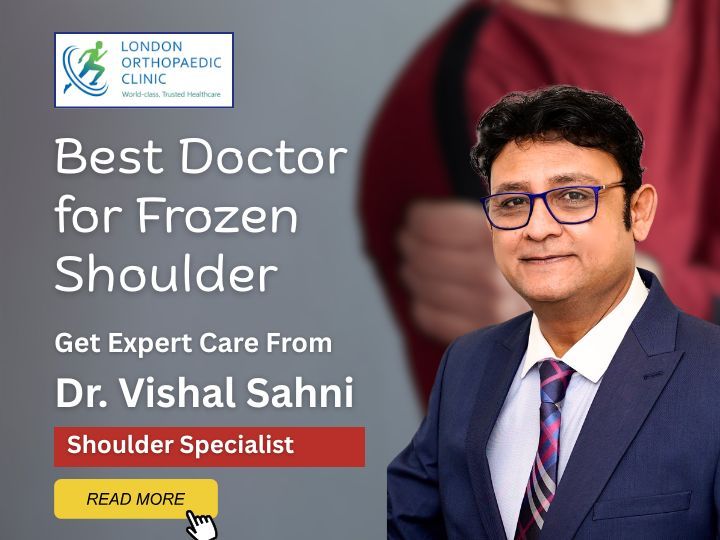
If you are searching online for “Can you suggest the best doctor for frozen shoulder near me?”, you are not alone. Frozen shoulder is one of the most common causes

Calcium deposits in the elbow tendons can be a painful and frustrating condition, especially when it affects daily activities like lifting, writing, gym workouts, or even simple movements such as
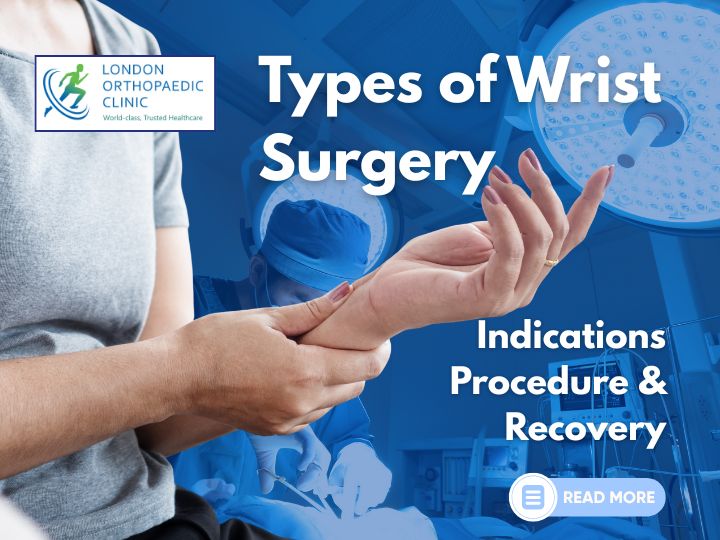
Wrist pain and stiffness can quietly affect your everyday life more than you realise. From holding a phone to cooking, writing, lifting weights, driving, or even doing simple household work
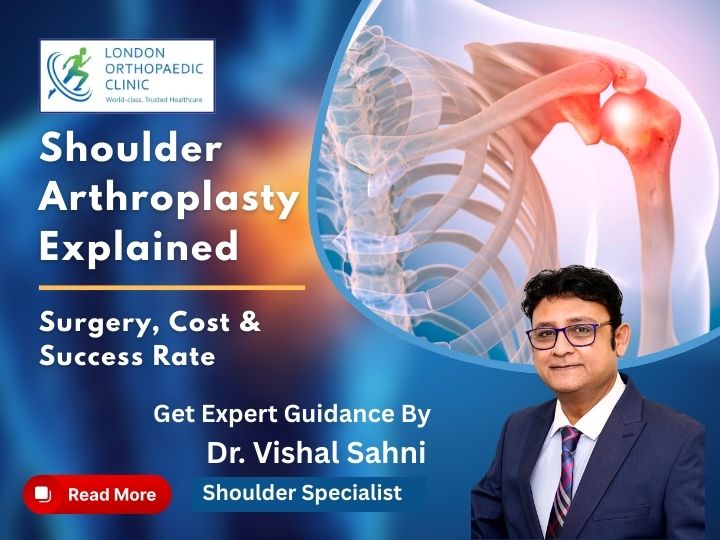
Shoulder pain can quietly take over your life. Simple activities like combing your hair, wearing clothes, lifting a bag, or even sleeping comfortably can become painful struggles. When medicines, physiotherapy,

Expert Orthopaedic Guide by Dr. Vishal Sahni London Orthopaedic Clinic, Nagpur Elbow pain may start quietly — a mild discomfort while lifting a bag, a twinge during gym workouts, or
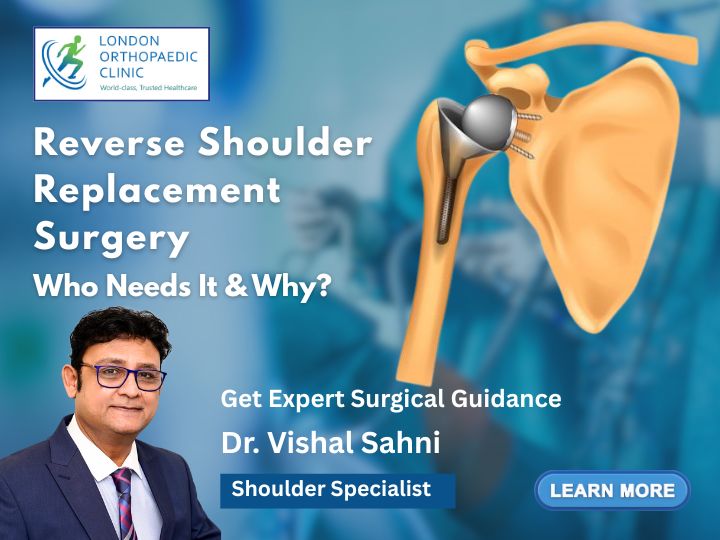
Learn who needs reverse shoulder replacement surgery and why it is recommended for severe shoulder pain, rotator cuff tears, arthritis, and failed surgeries. Expert care by Dr. Vishal Sahni at
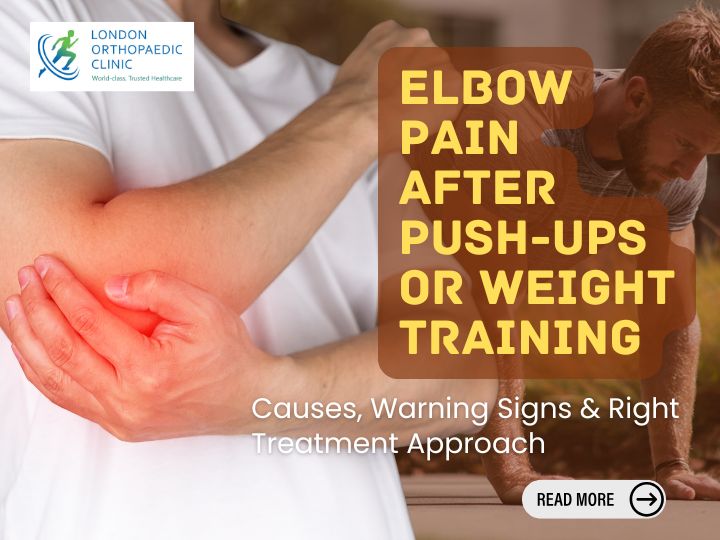
When Fitness Triggers Elbow Pain Push-ups and weight training are among the most common exercises followed by fitness lovers, gym beginners, athletes, and even people doing home workouts. These exercises

When Wrist Pain Starts Affecting Daily Life In today’s fast-paced lifestyle, wrist pain has quietly become one of the most common musculoskeletal complaints. From using smartphones and laptops to cooking,